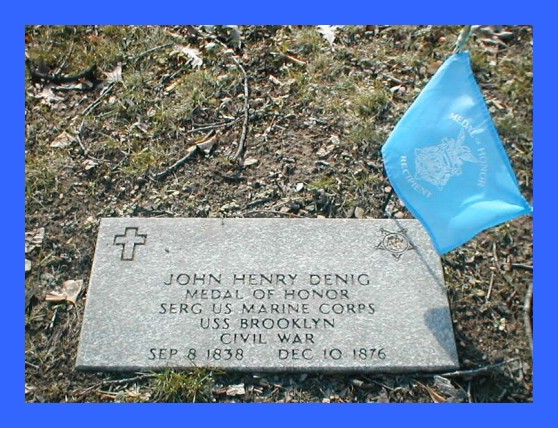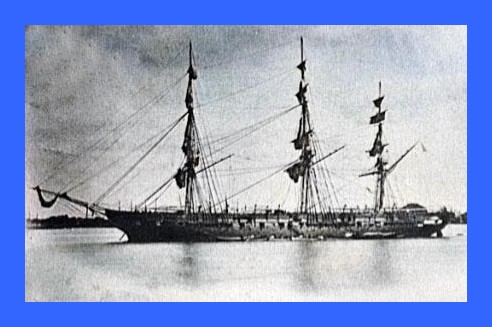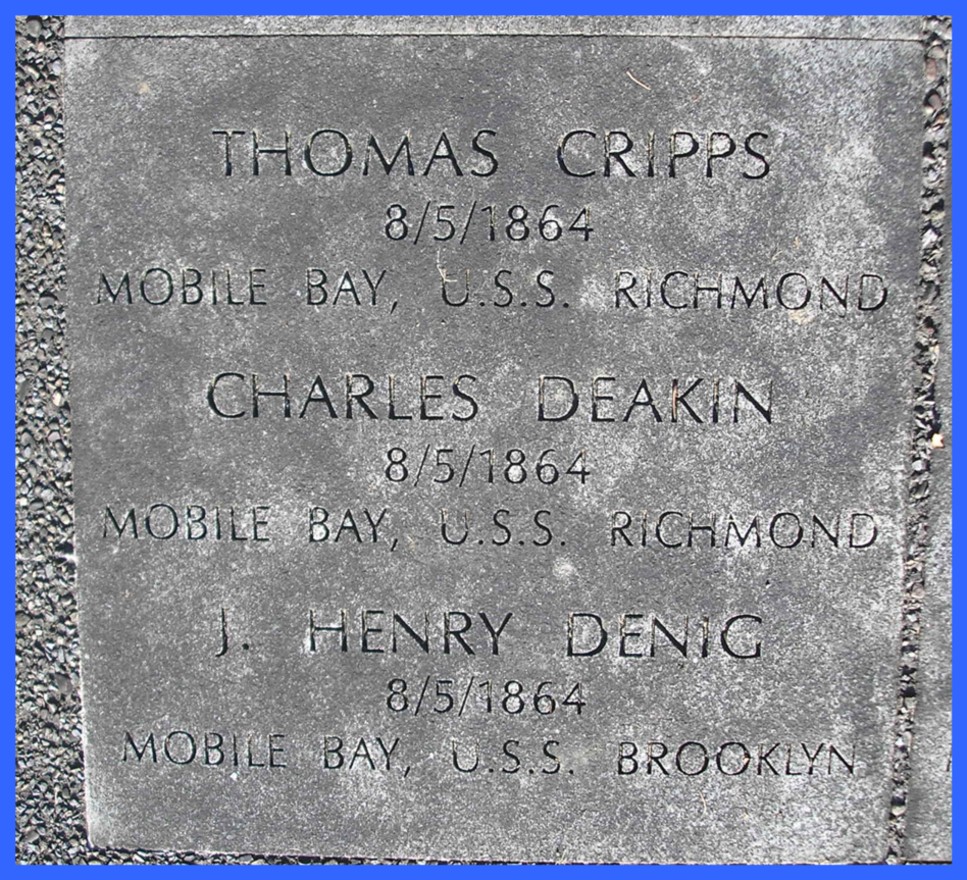
John Henry Denig died on December 10, 1876 at age 38, in York, Pennsylvania. A coroner’s inquest determined that the cause of his death was not known. Although he was a Civil War Medal of Honor recipient, no obituary noted that. During his later years he was best known throughout central Pennsylvania as Jack Shepherd, publisher of the Gospel Trumpet, which he went into the streets of towns in the Lykens Valley area and elsewhere and sold in order to make a living. There were the libel accusations against him, one of which landed him in prison. He also spent some time in the Pennsylvania State Lunatic Hospital, from which it is believed he escaped.
John Henry Denig is buried at Prospect Hill Cemetery, York, York County, Pennsylvania. At his grave there is a large stone as well as an in-ground, government-provided military marker (pictured above) that looks like it was placed there many years after his death.
Today’s post will focus on some aspects of his military career and his obituaries as found in area newspapers.
Military Record
During the Civil War, John Henry Denig served with distinction as a sergeant on board the U. S. S. Brooklyn. He enlisted in Philadelphia in June 1861, and his most notable action occurred during the Battle of Mobile Bay, Alabama, on August 5, 1864. Mobile was the last of the Confederate-held ports on the Gulf of Mexico east of the Mississippi River. Its capture secured the Union blockade.
During the battle, the U. S. S. Brooklyn and other ships were engaged against the C. S. S. Tennessee and Fort Morgan. In two hours of furious battle, the U. S. S. Brooklyn destroyed the fort’s batteries and forced the surrender of the C. S. S. Tennessee, resulting in a major Union victory.
Denig was honorably discharged in September 1864. In December 1864, by General Order, the Navy Department awarded the Medal of Honor to John Henry Denig and 23 of his shipmates for their part in the historic battle.
The citation read as follows:
On board the U. S. S. Brooklyn during action against rebel forts and gunboats and with the ram Tennessee, in Mobile Bay, August 5, 1864. Despite severe damage to his ship and the loss of several men on board as enemy fire raked her decks, Sgt. Denig fought his gun with skill and courage throughout the furious 2-hour battle with resulted in the surrender of the rebel ram Tennessee and in the damaging and destruction of batteries at Fort Morgan.
John Henry Denig is honored in Harrisburg on the east side of the Capitol in the Soldiers and Sailors Grove with a paving stone on which his name and service is inscribed.
The memorial for Pennsylvania recipients of the Medal of Honor is located in Harrisburg, Dauphin County on the east side of the Capitol Building. A grove of trees (Soldiers and Sailors Grove) flanks the grounds where the name of each individual with the date and place of service is noted on a stone in the ground.
The Medal of Honor is awarded by the president on behalf of Congress to a person who distinguishes himself by gallantry at the risk of his or her own life above or beyond the call of duty while engaged in a military operation. The individual who is awarded the medal must have performed an act that is clearly above any act performed by his or her comrades. The medal signifies extraordinary merit and there is no higher military honor than can be given.
The Medal of Honor was created during the Civil War and its first recipients were men who served the Union cause in the Civil War. A total of 1522 medals were awarded for service in the Civil War, with approximately one-fifth of those going to persons with a connection to the Commonwealth of Pennsylvania. For a complete list of the Civil War recipients of the Medal of Honor, see List of American Civil War Medal of Honor Recipients.
___________________________________________________
Obituaries
From the York Democratic Press, December 15, 1876:
DEATH OF JACK SHEPHERD
John Henry Denig, alias Jack Shepherd, was found dead in a hay shed, on David Smyser‘s farm, in the occupancy of Felix Bentzil, near the Short Line railroad, about two miles south of town, in West Manchester township, on Saturday evening. His body was discovered by mere chance by Casper Hilbert, through the opening in the building, as he was passing along the road, and at once made the facts known to Mr. Bentzel, who reported the case to Coroner Brickley, and on Sunday morning that officer summoned the following jury: Feliz Bentzel, Martin Ebert, Jacob Beck, Christian N. Kehr, Levi Slagel and Henry Kauffman. Upon investigation the body was identified to be that of John Henry Denig, well know to the public. The jury rendered a verdict that “he had no marks of violence appearing on his body and came to his death several days previous to the 10th day of December from some unknown cause to this jury.
The remains were then conveyed to the residence of the brother-in-law of the deceased, Mr. Alexander, on south Penn Street.
Thus ended the life of poor “Jack Shepherd,” whose quaint history is so full of romance.
We append the following particulars connected with his death, and some incidents of his life, from the Daily, which we infer is from the pen of Henry F. Thomas, Esq., under whom “John” served his apprenticeship in the Eagle office:
The body when discovered was in a perfectly natural position, giving evidence that the unfortunate man died without a struggle. Both his boots were off his feet and also one stocking. His hat was lying beside his boots, and nothing whatever was found in his pockets but his lining. His name was inscribed on one of his boot legs. The body was frozen perfectly stiff, and not the least sign of decomposition was seen, although it was evident that he had died three days ago and his face was scarcely recognizable.
It appears that for the last year or more Mr. Denig was quite melancholy, having lost all ambition and often wished that he was dead. He had his home with his sister, Mrs. Alexander, who did all in her power for his comfort and encouragement. Of late he got into the habit of leaving home for weeks at a time and then return. The last time he left home was November 13th. The last that was seen of him was about two weeks ago in the neighborhood where he was found dead.
When but ten or twelve years of age, the subject of this notice evinced a natural talent for originality and activity, and his general aptness, under whatever circumstances he was placed, was remarkable. We remember him best an apprentice to the printing business, in which capacity he served about five years in the office of the American Eagle, a weekly paper published in York, some twenty years ago. While not an exception to the generality of “printer’s boys: in mischievous trickery and jokes, he certainly excelled many in quick perception and practical intelligence. Though eccentric he always studied his master’s interests, but never forgetful of his own, and anything entrusted to his care, was rigidly attended to and guarded; and any difficult feat which came in the line of business, the greater the risk, or danger of its execution, the better it agreed with his fearless vivacity and love of adventure and the more eager he was to undertake it. He never thought it a failure.
He was afterwards engaged in book-keeping, in Baltimore, Maryland – first with Messrs. H. N. Thomas & Company – then with their successors, Messs. Thomas C. Basshore & Company, giving satisfaction to employers in both instances. Here he committed his greatest error – instead of continuing mercantile life, in a settled position, he yielded to the cravings of his naturally adventurous inclinations, and left home and friends – certainty for an uncertainty, and commenced a roving life. He went West and there filled some responsible and lucrative positions. When the late war broke out he enlisted as a marine and served with much bravery as such during the entire war – having been promoted to a Sergeant on account of his soldier-like conduct.
Some time after the war he returned home and gave evidence of insanity and for some months was under treatment at the State Lunatic Asylum at Harrisburg. He made his escape from that institution and returned to York and soon commenced the publication of the paper so familiarity known as Jack Shepherd’s Gospel Trumpet. The remarkable energy exhibited by him in the sale of his papers is well remembered by the citizens of York, Harrisburg, Columbia, Lancaster, Baltimore and other places. At Harrisburg he was convicted of libel and sentenced by Judge Pearson to a term of imprisonment in the Dauphin County Jail. After his discharge he resumed the publication of his paper but not receiving the desired patronage he abandoned the enterprise and soon after that his health failed. He became low spirited and often regretted the course he had pursued. The report of his death on Sunday, cause quite a stir among our citizens and many expressions of sympathy were made on his sad end. He was 38 years of age.
_____________________________________________
From the Sunbury Gazette, December 15, 1876:
DEATH OF JOHN HENRY DENIG
John Henry Denig, who was noticed on our streets last summer blowing a silver trumpet, and selling his paper called Jack Sheppard’s Gospel Trumpet, was found dead, on Saturday night last, in a straw shed, two miles from York. The York Evening Dispatch says:
“When discovered the body was lying in a perfectly natural position, and it was evident that at the last he had suffered but little. He had taken off both his boots and one stocking, when he, without doubt, became powerless to remove the other. Beside his boots lay his hat and his pockets were entirely empty. His name was found upon the leg of one of his boots. Decomposition had not set in, although probably from want and suffering he was so changed as to be hardly recognizable. The body was frozen perfectly stiff.”
_____________________________________________
From the Sunbury Gazette, December 15, 1876:
JACK SHEPERD DEAD
John Henry Denig, the half crazy person who called himself “Jack Shepard” and published a paper called the Gospel Trumpet, died last week near York, Pennsylvania. Denig frequently visited Sunbury, and with the sound of the trumpet sold his papers in our streets. He was an independent candidate for Congress this fall in this district, and there were people crazy enough to vote for me. The following account of his death we take from the Harrisburg Patriot:
“On last Saturday night while Mr. Casper Gilbert was passing a straw shed off the farm of David Smyser, in West Manchester Township, a little more than two miles from York, he discovered, as he supposed, a man’s head through an opening in the building. He at once notified Mr. Felix Bentzel, who is the tenant of the farm, and upon searching they found the lifeless body of a man unknown to them. They concluded to leave the body undisturbed until yesterday morning, when the coroner, Dr. O. C. Brickley, was notified by Mr. Bentzel and at once proceeded to the spot to hold an inquest.
“The body was identified as that of John Henry Denig, well known to the public. A jury was immediately summoned and a verdict rendered as follows: That he had no marks of violence on his body, and came to his death several days previous to the 10th of December from some cause unknown to the jury.'”
__________________________________________________
From the Chambersburg Saturday Local, December 16, 1876:
JOHN H. DENIG, better known as Jack Shepherd, late editor of the Gospel Trumpet, died at York, Pennsylvania, on Sunday last. Mr. Denig was a native of Chambersburg, son of the late Rev. John Denig.
__________________________________________________
News articles from Newspapers.com.
Corrections and additional information should be added as comments to this post.

